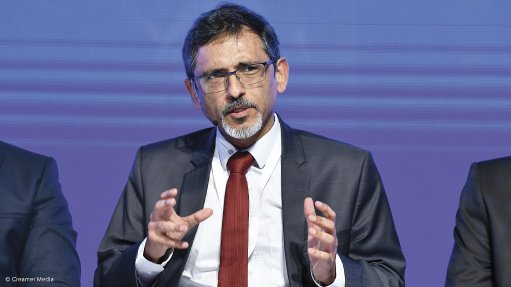Redoubling Your Effort
The definition of ‘fanaticism’ is when you redouble your effort when your aim is forgotten. And in that world of climate change, that area of cosy illusions and comforting half truths, this has finally occurred. The climate believers think that carbon dioxide (CO2) is causing the world to heat up, that the sea levels will rise by between 900 mm and 9 000 mm, depending on who you talk to.
At the Paris Climate agreement, it was agreed to do several things, including keeping global temperatures “well below” 2 ºC above pre-industrial times and “endeavour to limit” them even more, to 1.5 ºC. Secondly, it was agreed to limit the amount of greenhouse gases emitted by human activity to the same levels that trees, soil and oceans can absorb naturally, beginning at some point between 2050 and 2100 and, thirdly, to review each country’s contribution to cutting emissions every five years so that they can scale up to the challenge. It was also agreed that rich countries help poorer nations by providing ‘climate finance’ to adapt to climate change and switch to renewable energy.
Now, I am not a climate believer. I think the whole thing is a scam, a way of getting research grant money to investigate something that is nonexistent and should be lumped with Y2K (aircraft would fall out of the sky at the stroke of midnight on January 1, 2000, and so on), bird flu and swine flu, power lines cause cancer, and so on. In short, I am a climate denier (some say ‘a realist’). The developing countries are very very keen on the last item agreed on in Paris – they say they need financial and technological help to leapfrog fossil fuels and move straight to renewables. Currently, they have been promised $100-billion (£67-billion) a year by 2020 – not as much as many countries would like (awe shame).
But let us not debate the issue. Into the pond has swum the most extraordinary idea, the brainchild of a Canadian. His thesis is that we (the world) must remove CO2 from the atmosphere and turn it into fuel, as in diesel and petrol. Then, if a vehicle uses this fuel, it is carbon neutral and there will be no increase in CO2 from that vehicle. To do this requires energy. One Canadian plant uses the output of a 300 MW hydropower station to capture and convert the CO2. Capturing it costs $600/t of CO2 and the fuel produced is about $12/ℓ. There are other pilot plants worldwide which are designed to capture CO2 and currently just store it. These other plants use geothermal sources and natural gas.
Proponents of this idea are scientists and engineers giving out numbers on how much a carbon capture plant will cost and what, once the carbon is captured, is to be done with it (store it underground? make soft drinks?) and, at the same time, naming figures such as $20-billion to produce 200 carbon capture plants, each capable of capturing one-million tons of CO2 a year. All these plants would use land and would have to have a source of clean energy, such as hydropower, geothermal or natural gas.
One of the difficulties with all this is that some people, the climate believers, regard climate change as undisputedly true. They brush aside any suggestion that it is all about getting research finance and grants. Other people, the climate deniers (which include at least one Nobel laureate, prize winner for physics) want the whole matter to be dropped, perhaps in favour of spending money on other means of benefiting humanity. One such method is to join the dots: Africa has many people, many Africans burn millions of litres of kerosene every year and kerosene produces CO2. Thus, create $20-billion worth of mini solar grids and the problem lessens, if there is one or not.
Comments
Announcements
What's On
Subscribe to improve your user experience...
Option 1 (equivalent of R125 a month):
Receive a weekly copy of Creamer Media's Engineering News & Mining Weekly magazine
(print copy for those in South Africa and e-magazine for those outside of South Africa)
Receive daily email newsletters
Access to full search results
Access archive of magazine back copies
Access to Projects in Progress
Access to ONE Research Report of your choice in PDF format
Option 2 (equivalent of R375 a month):
All benefits from Option 1
PLUS
Access to Creamer Media's Research Channel Africa for ALL Research Reports, in PDF format, on various industrial and mining sectors
including Electricity; Water; Energy Transition; Hydrogen; Roads, Rail and Ports; Coal; Gold; Platinum; Battery Metals; etc.
Already a subscriber?
Forgotten your password?
Receive weekly copy of Creamer Media's Engineering News & Mining Weekly magazine (print copy for those in South Africa and e-magazine for those outside of South Africa)
➕
Recieve daily email newsletters
➕
Access to full search results
➕
Access archive of magazine back copies
➕
Access to Projects in Progress
➕
Access to ONE Research Report of your choice in PDF format
RESEARCH CHANNEL AFRICA
R4500 (equivalent of R375 a month)
SUBSCRIBEAll benefits from Option 1
➕
Access to Creamer Media's Research Channel Africa for ALL Research Reports on various industrial and mining sectors, in PDF format, including on:
Electricity
➕
Water
➕
Energy Transition
➕
Hydrogen
➕
Roads, Rail and Ports
➕
Coal
➕
Gold
➕
Platinum
➕
Battery Metals
➕
etc.
Receive all benefits from Option 1 or Option 2 delivered to numerous people at your company
➕
Multiple User names and Passwords for simultaneous log-ins
➕
Intranet integration access to all in your organisation


















